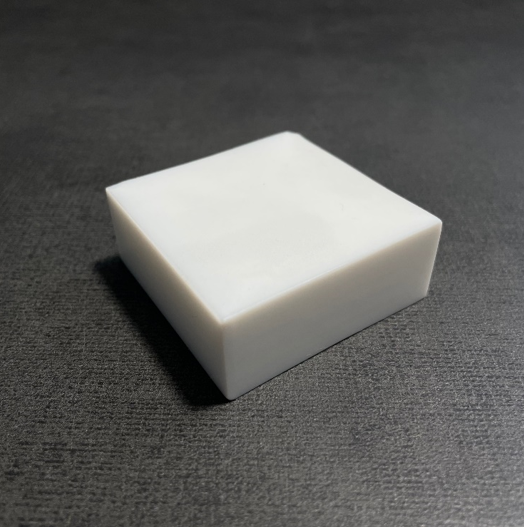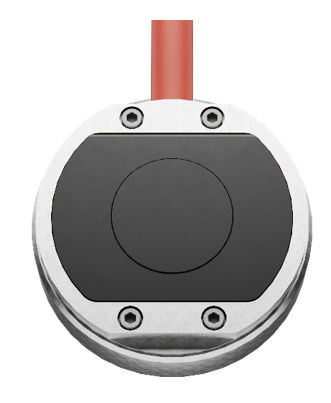In this application, we will be investigating the thermophysical properties to understand the thermal conductivity of Teflon ®.
Teflon® (polytetrafluoroethylene) is a slick fluoropolymer that consists of carbon and fluorine atoms. Teflon® is used in a wide range of industries and applications from cookware to coatings and bearings and has gained popularity due to its low friction as well as thermal and chemical resistance. Teflon® is commonly used in high-temperature, corrosive environments, and as high-performance insulators in electrical applications.
While the mechanical properties of Teflon® are well understood, its thermal conductivity remains rarely addressed.
A single sample of Teflon® was measured for thermal conductivity (W/m·K), thermal diffusivity (mm2/s), and volumetric specific heat (MJ/m3K) using the Measurement Platform Versatile (MP-V) with Modified Transient Plane Source (MTPS) sensor. The MP-V is used to measure the thermal conductivity and thermal diffusivity of isotropic, anisotropic and slab materials in the asymmetric configuration.
Teflon® is a synthetic thermoplastic fluoropolymer. At room temperature, Teflon® is a white solid compound with a very high melting point. Its capacity to resist adhesion is one of its primary characteristics, which is why it is so frequently used in non-stick kitchenware, waterproof clothing, and friction-reducing gadgets. It is the perfect material for coating various industrial equipment and appliances since it has great resistance to corrosion.

Figure 1. Teflon sample
The MP-V is designed to test the absolute thermal conductivity, thermal diffusivity, specific heat and thermal effusivity of solids, liquids, pastes and powders. The MP-V features a powerful combination of the transient plane source (TPS, ISO 22007-2) and transient hot-wire (THW, ASTM D7896-19) methods with a variety of sensors that are compatible with it.
Transient methods share similar theories with differences that are specific to their primary design. The sensors are electrically connected to a power supply and sensing circuit. A current passes through the sensors and creates an increase in temperature, which is recorded over time. The heat generated is then diffused into the sample at a rate dependent on the thermal transport characteristics of the material.
The MP-V features the proprietary intelligent Transient Plane Source (iTransient) function that is designed for the automation of testing and analysis. iTransient requires only the sample name as user input and the appropriate sensor and test parameters for each individual sample are determined.
The Modified Transient Plane Source Sensor (MTPS) is comprised of a TPS sensor configured with known backing insulation, permanently housed in a rugged single-sided configuration. This unique design combines the intelligent design of the sensor and measurement capabilities to generate bulk and directional properties for all materials. This sensor is capable of testing isotropic, anisotropic, slab and one-dimensional samples.

Figure 2. MTPS sensor.
A single piece of Teflon® was measured in the asymmetric configuration using absolute MTPS sensor. Optimal measurement parameters of 40s and 75mW were determined using the proprietary iTransient Plane Source (iTransient) application to achieve appropriate temperature rise and accurate, repeatable results.
Using the extended sensor correction, the contact resistance between the sensor and sample was measured and automatically removed. This ensures the best analysis possible is used for calculation.
Table 1. Thermophysical measurements of Teflon®.
| Temperature (ᵒC) | Thermal Conductivity (W/m·K) | Thermal Diffusivity (mm2/s) | Volumetric Specific Heat (MJ/m3K) |
| 23 | 0.298 | 0.114 | 2.733 |
| 0.305 | 0.115 | 2.653 | |
| 0.306 | 0.116 | 2.637 | |
| 0.306 | 0.116 | 2.637 | |
| 0.304 | 0.114 | 2.667 | |
| Mean | 0.304 | 0.115 | 2.665 |
| Standard Deviation | 0.003 | 0.001 | 0.040 |
| %RSD | 1.1 | 0.9 | 1.5 |
Teflon®, 40 sec. 0.075 W, 23°C, n=5.
The excellent thermal stability and mechanical and dielectric properties of Teflon® make it ideal for many different applications. In this application, we investigated the thermal properties of Teflon® and found that it was highly insulative with a thermal conductivity of 0.304. Measured with accuracy and repeatability with the MTPS sensor. The thermal conductivity of Teflon measured with the MTPS was found to be in good accordance within 2% with the literature value of 0.3 W/m·K.
Cai, X., Jiang, Z., Zhang, X., Gao, T., Yue, K., & Zhang, X. (2018). Thermal property improvement of polytetrafluoroethylene nanocomposites with graphene nanoplatelets. RSC Advances, 8(21), 11367–11374. https://doi.org/10.1039/c8ra01047a
Buerkle, M., & Asai, Y. (2017). Thermal conductance of Teflon and Polyethylene: Insight from an atomistic, single-molecule level. Scientific Reports, 7(1). https://doi.org/10.1038/srep41898